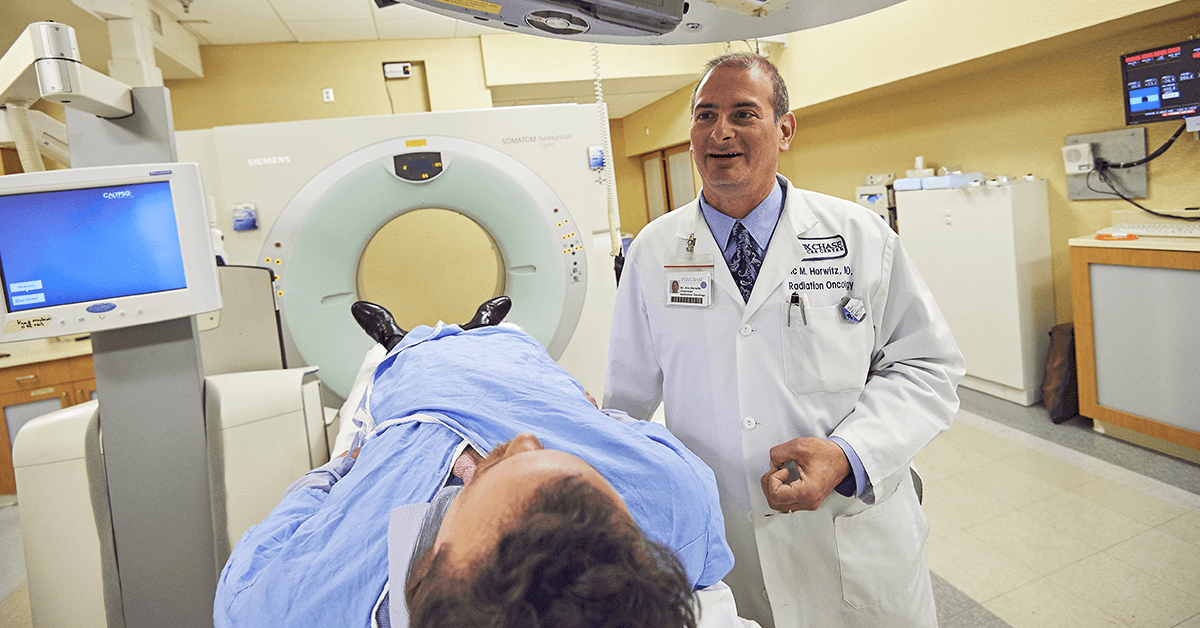
The Good News About Radiation Treatments and Your Skin
-
Many people think skin problems go hand-in-hand with radiation treatments for cancer. But that’s not always the case anymore.
“Basically, most things we do now don’t impact the skin at all” said Eric M. Horwitz, MD, FABS, FASTRO, Chair of Radiation Oncology at Fox Chase Cancer Center. “And if the skin is affected, there are simple ways to take care of it.”
What you can expect
While skin reactions from radiation therapy are rarer now, some patients do experience skin that looks red, irritated, swollen, or sunburned. And after a few weeks, the affected area might become dry, flaky, or itchy.
Still other patients have no reaction at all. Whether or not you’ll have a reaction depends on your skin type and the area in the body you’re being treated because the skin on some parts of the body is more sensitive to radiation treatments than others.
“For instance, if we’re treating the chest wall or we’re treating breast or head and neck cancers, you can get more skin reaction,” Horwitz said. “Sometimes extremities—arms or legs—can get a skin reaction.”
There’s also a scientific reason why some radiation treatments are more likely to trigger changes to the skin.
“It depends on the angle of the x-ray beam that hits your skin and the energy of the radiation that hits the skin,” Horwitz explained. “Physics plays a role in why it happens. So, if we’re treating the pelvis or abdomen, the energy is focused deep below the skin’s surface. But if we’re treating a breast, it’s more superficial, so there’s an increased dose of radiation affecting the skin.”
If you’re getting both chemotherapy and radiation, that can change the effect on your skin as well, Horwitz said.
How to care for your skin
American Cancer Society recommends being extra kind to your skin during and after radiation treatment:
Don’t rub, scratch or scrub your skin. If the area needs to be covered, use paper tape. Try to put the tape outside the treatment area and in a different spot each time.
Protect your skin from the sun. Your skin might be extra sensitive to sunlight. Wear dark-colored or UV-protective clothing. Talk to your care team about using sunscreen.
Dress for comfort. Avoid stiff, rough, or tight clothes around the treatment area. Opt for soft, loose garments. And don’t starch your clothes.
Be picky about skin care products. Mild soap and lukewarm water are your best bets for cleansing your skin. Your care team can recommend gentle products like lotion or deodorant. Check with them before using any product on the treated area, including medicines, perfumes, and cosmetics. Some may irritate your skin or even affect the dose of radiation you receive.
Keep the temperature steady. Protect your skin from hot and cold temperatures. Avoid things like heating pads, heat lamps, and ice packs. Even hot water may hurt your skin.
Talk to your care team about how your skin may be affected during radiation treatments. And if skin discomfort becomes an issue, ask about your options.
“People who get radiation do really well,” Horwitz said. “Part of our job in taking care of the person is also taking care of any side effects. Most people don’t actually have any skin effects and if they do, we help them treat their skin irritation.”
Learn more about the radiation oncology team at Fox Chase Cancer Center.
